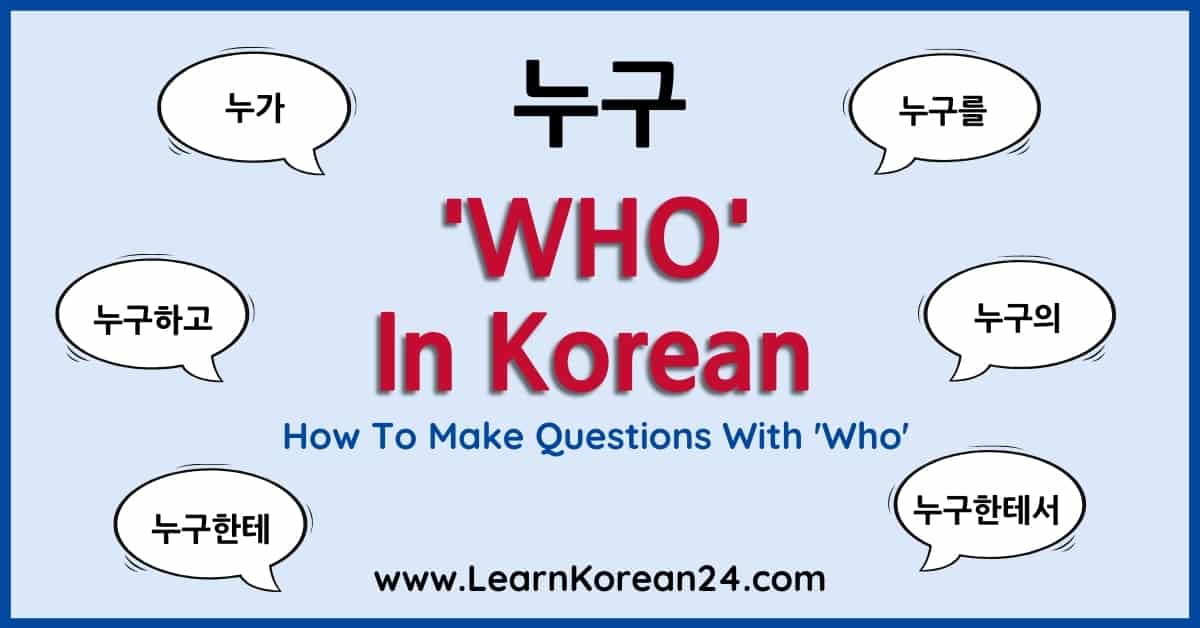Who In Korean | Questions in Korean With Who
Being able to make questions in Korean is essential if you are to communicate successfully. There are many question words in Korean, corresponding to who, what, where, when, and how.
In this lesson, you will learn how to make questions in Korean with ‘who’. You’ll learn 6 different ways to say ‘who’ in Korean, and how to make questions in Korean with who.
The basic way to say ‘who’ in Korean is 누구 (nu-gu). 누구 can be used in many different ways depending on the particle that is attached to 누구. These are:
- 누가 = ‘who’ as the subject of a sentence
- 누구를 = ‘who’ as the object of a sentence
- 누구하고 = with who
- 누구한테 = to who
- 누구한테서 = from who
- 누구의 = whose
Who In Korean
Here are the different ways to say ‘who’ in Korean to help you make questions in Korean with ‘who’.
누구 – Who (Basic Form)
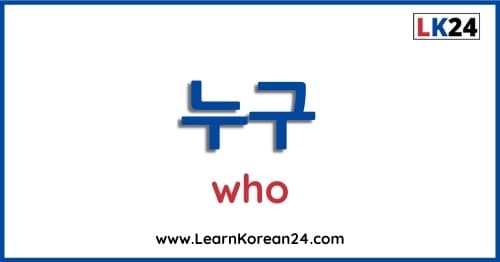
The basic way to say who in Korean is 누구. Here are some example questions you can make with this basic form of ‘who’ in Korean.
- 누구세요? = Who are you?
- 이 사람은 누구예요? = Who is this person?
- 저 가수는 누구예요? = Who is that singer?
- 그 사람은 누구였어요? = Who was he/she?
By adding a Korean particle to 누구 you can use this interrogative word in many different Korean questions.
누가 – ‘Who’ As The Subject Of The Sentence
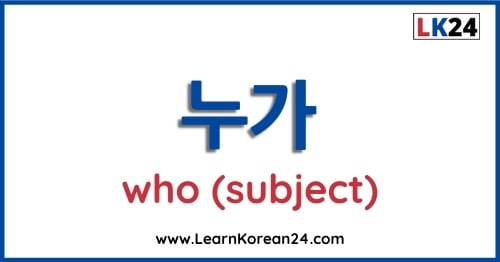
When ‘who’ is the subject of a sentence, we use 누가. 누가 is made up of 누구 plus the subject marking particle 가. 누구+가 becomes 누구가 but Koreans never say 누구가. 누구가 is always shortened to 누가.
Here are some example questions in Korean with 누가:
- 누가 아파요? = Who is sick?
- 사무실에 누가 있어요? = Who is at the office?
- 이 집에 누가 살았어요? = Who lived in this house?
- 여기에 누가 올 거예요? = Who will come here?
In each of these sentences, ‘who’ is the subject of the sentence and so 누구 is marked with the subject marking particle 가 and becomes 누가.
*If you’re not sure what a ‘subject’ of a sentence is, a subject of a sentence is the person or thing that is doing an action (verbs) or being described (adjectives).
누구를 – ‘Who’ As The Object Of The Sentence
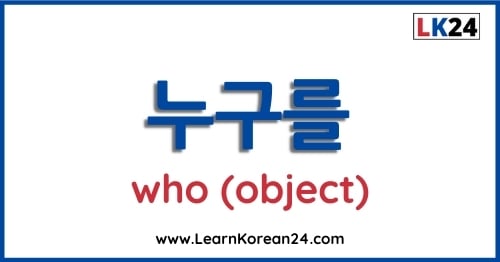
When ‘who’ is the object of a sentence, we use 누구를. 누구를 is made up of 누구 plus the object marking particle 를. 누구 + 를 becomes 누구를.
As 누구를 is using the word ‘who’ as the object in a sentence, the verb that follows 누구를 must always be a transitive verb (i.e. a verb which can have a direct object.)
Here are some example questions in Korean with who as the object of a sentence:
- 어제 누구를 봤어요? = Who did you see yesterday?
- 오늘 누구를 만날 거예요? = Who will you meet today?
- 배우 중에 누구를 좋아해요? = Among actors/actresses, who do you like?
In each sentence, ‘who’ is the object of the sentence, and so 누구 is marked with the object parking particle 를 to make 누구를. In spoken language, 누구를 is often shortened to 누구, especially when it is already obvious what the object of the sentence is.
*If you’re not sure what the object of a sentence is, and object in a sentence is the noun that is being affected by the verb.
누구하고 – With Who
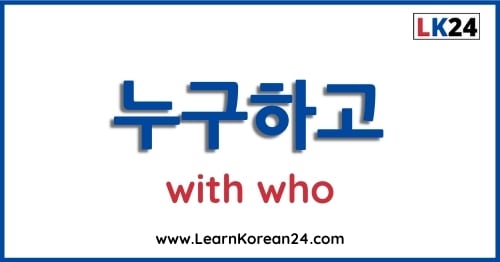
When you want to say ‘who with’ in Korean we say 누구하고. 누구하고 is made up of 누구 plus the particle 하고 which translates as ‘with’.
The Korean words 누구랑 and 누구와 also mean ‘who with’ in Korean. 누구하고 and 누구랑 are often used in spoken language, and 누구와 is often used in written language.
Here are some example questions in Korean with 누구하고:
- 누구하고 살아요? = Who do you live with?
- 누구하고 놀았어요? = Who did you hang out with?
- 누구하고 영화를 봤어요? = Who did you watch the movie with?
- 누구하고 거기에 갈 거예요? = Who will you go there with?
누구한테 – To Who
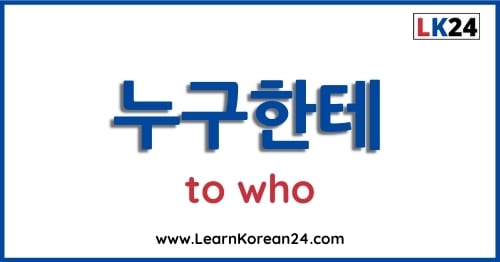
When you want to say ‘to who’ in Korean, as in “Who did you give it to.”, we use 누구한테. 누구한테 is made up of 누구 plus the particle 한테 which translates as ‘to’.
누구한테 and 누구에게 both mean ‘to who’ in Korean. 누구한테 is used in spoken language and 누구에게 is used in written language.
Here are some example questions in Korean with 누구한테:
- 아까 누구한테 갔어요? = A moment ago, who did you go to?
- 누구한테 그걸 빌려줬어요? = Who did you lend it to?
- 누구한테 그걸 말할 거예요? = Who will you tell it to?
- 누구한테 이 선물을 줄 거예요? = Who will you give this present to?
누구한테서 – From Who
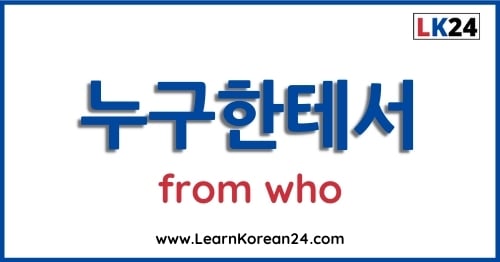
When you want to say ‘from who’ in Korean, as in “Who did you receive this from.”, we use 누구한테서. 누구한테서 is made up of 누구 plus the particle 한테서 which translates as ‘from’.
누구한테서 and 누구에게서 both mean ‘from who’ in Korean. 누구한테서 is used in spoken language and 누구에게서 is used in written language.
Here are some example questions in Korean with 누구한테서:
- 누구한테서 그걸 들었어요? = Who did you hear it from?
- 누구한테서 이걸 받았어요? = Who did you receive this from?
- 누구한테서 그 책을 빌렸어요? = Who did you borrow that book from?
누구의 – Whose
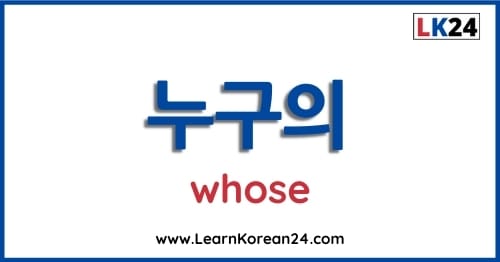
When you want to say ‘whose’ in Korean we say 누구의. 누구의 is made up of 누구 plus the possessive particle 의 which means ‘of’. So, 누구의 literally means ‘of who’.
There are two main ways to use 누구의 in sentence. One is 누구의 plus a noun. For example, 누구의 plus the noun 책 (book) means ‘whose book’.
The second way is 누구의 plus 것 which means ‘thing’. So, 누구의 것 means ‘whose thing’. 누구의것 is often shortened to 누구 거.
Here are some example questions in Korean with 누구의:
- 이건 누구의 책이에요? = Whose book is this?
- 저건 누구의 가방이에요? = Whose bag is that?
- 이건 누구 거예요? = Whose is this (thing)?
- 저건 누구 거예요? = Whose is that (thing)?
Thanks for reading. I hope you found this post about ‘who’ in Korean useful. Before you go, check out our other free Korean learning resources, including our Online Korean Lessons and our Korean Vocabulary Lists.

